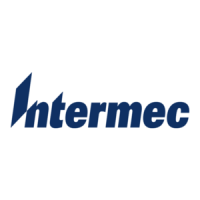TRAKKER Antares 2420 and 2425 Hand-Held Terminal User’s Manual
3-4
Choosing the Symbologies the Terminal Decodes
This list contains all the bar code symbologies the terminal can decode:
• Codabar • Code 39 • Interleaved 2 of 5 (I 2 of 5)
• Code 11 • Code 49 • MSI
• Code 16K • Code 93 • Plessey
• Code 2 of 5 • Code 128 • UPC/EAN
When the terminal ships, only these three symbologies are enabled:
• Code 39
• Code 128
• UPC/EAN
If you are using one of the other symbologies to encode your bar code labels, you need to
configure the terminal and enable the symbology. To quickly enable symbologies, see
“Enabling Bar Code Symbologies” in Chapter 1.
To ensure that the terminal can operate quickly and efficiently, you should enable only
the bar code symbologies that you are going to scan. When you enable each bar code
symbology, you may need to set a check digit, the length of the bar code label, or other
options. For help, see the bar code symbology in Chapter 9, “Configuration Command
Reference.”
Specifying How the Terminal Will Communicate
The T2420 uses serial communications to send data to and from another serial device.
The T2425 uses radio frequency (RF) communications to communicate with other
devices in Intermec’s 2.4 GHz RF network. You can also use the T2425’s serial port to
send and receive data. Before you can use the terminal in your wired or wireless network,
you must configure the serial port and/or network parameters.
On the T2425, you must set the RF network parameters, radio parameters, and address
information before the T2425 can communicate with other devices in the 2.4 GHz RF
network.
To learn how to configure the terminal to fit into your wired or 2.4 GHz RF network, see
Chapter 4, “Operating the Terminal in a Network.”

